NSB303 Case Study: Colorectal Cancer, Treatment, and Survivorship
VerifiedAdded on 2023/03/20
|9
|2481
|35
Essay
AI Summary
This essay presents a case study of a 65-year-old patient, John, diagnosed with colorectal cancer, focusing on his treatment journey and care plan. The case study explores the potential use of adjuvant chemotherapy, its benefits, and the patient's consent to receive it. It details discharge planning, including regular check-ups, CEA testing, and imaging scans to monitor for recurrence. The essay also emphasizes the importance of collaborative approaches to education and self-management, addressing the patient's physical, psychological, social, and spiritual well-being. It highlights the role of a community nurse in providing health literacy, counseling on lifestyle changes, and the significance of support groups and spiritual guidance. The essay concludes by emphasizing the need for a comprehensive survivorship plan tailored to the patient's needs, considering factors such as diet, exercise, and emotional support to improve the overall quality of life and minimize the risk of relapse.

Running head: HEALTHCARE
HEALTHCARE
Name of the Student:
Name of the University:
Author Note:
HEALTHCARE
Name of the Student:
Name of the University:
Author Note:
Paraphrase This Document
Need a fresh take? Get an instant paraphrase of this document with our AI Paraphraser
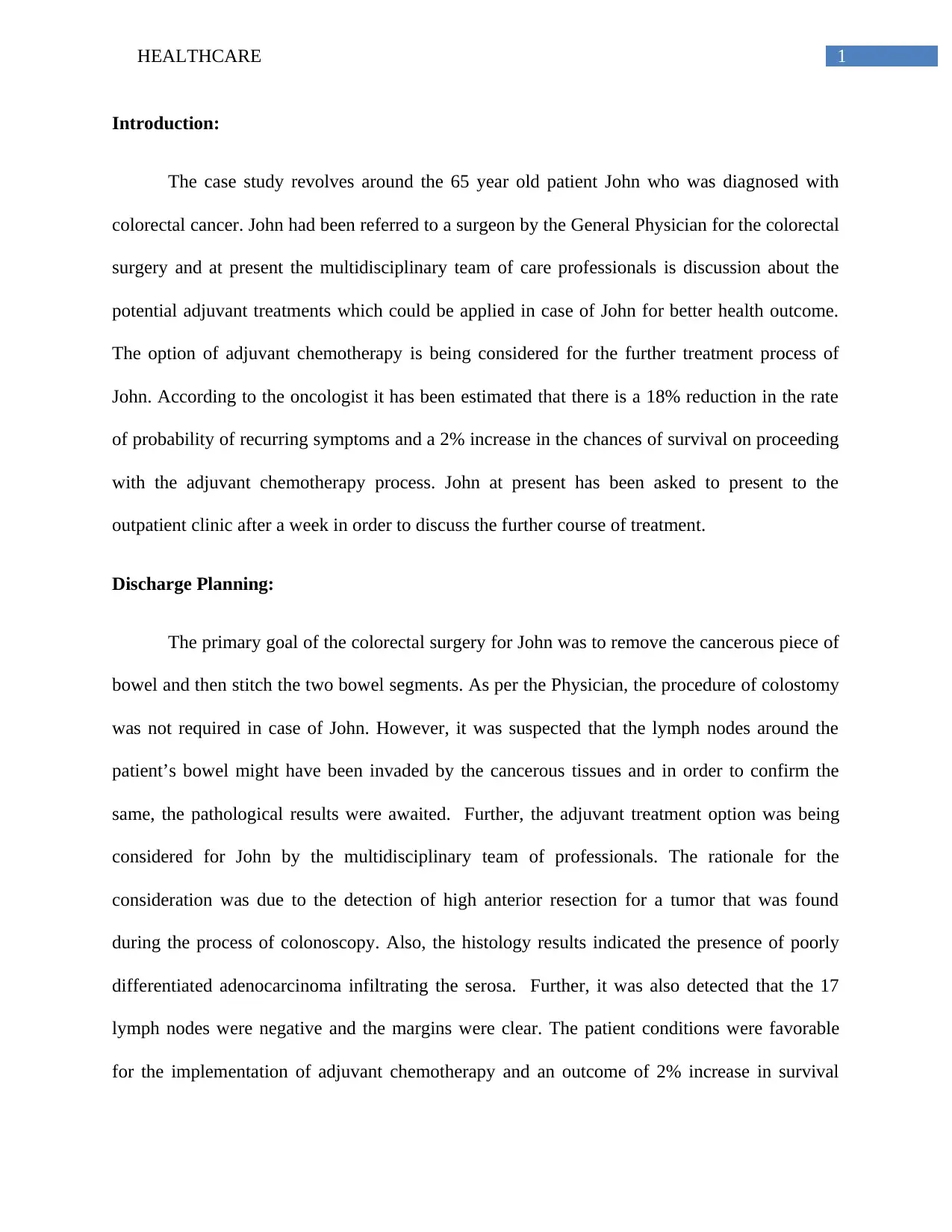
1HEALTHCARE
Introduction:
The case study revolves around the 65 year old patient John who was diagnosed with
colorectal cancer. John had been referred to a surgeon by the General Physician for the colorectal
surgery and at present the multidisciplinary team of care professionals is discussion about the
potential adjuvant treatments which could be applied in case of John for better health outcome.
The option of adjuvant chemotherapy is being considered for the further treatment process of
John. According to the oncologist it has been estimated that there is a 18% reduction in the rate
of probability of recurring symptoms and a 2% increase in the chances of survival on proceeding
with the adjuvant chemotherapy process. John at present has been asked to present to the
outpatient clinic after a week in order to discuss the further course of treatment.
Discharge Planning:
The primary goal of the colorectal surgery for John was to remove the cancerous piece of
bowel and then stitch the two bowel segments. As per the Physician, the procedure of colostomy
was not required in case of John. However, it was suspected that the lymph nodes around the
patient’s bowel might have been invaded by the cancerous tissues and in order to confirm the
same, the pathological results were awaited. Further, the adjuvant treatment option was being
considered for John by the multidisciplinary team of professionals. The rationale for the
consideration was due to the detection of high anterior resection for a tumor that was found
during the process of colonoscopy. Also, the histology results indicated the presence of poorly
differentiated adenocarcinoma infiltrating the serosa. Further, it was also detected that the 17
lymph nodes were negative and the margins were clear. The patient conditions were favorable
for the implementation of adjuvant chemotherapy and an outcome of 2% increase in survival
Introduction:
The case study revolves around the 65 year old patient John who was diagnosed with
colorectal cancer. John had been referred to a surgeon by the General Physician for the colorectal
surgery and at present the multidisciplinary team of care professionals is discussion about the
potential adjuvant treatments which could be applied in case of John for better health outcome.
The option of adjuvant chemotherapy is being considered for the further treatment process of
John. According to the oncologist it has been estimated that there is a 18% reduction in the rate
of probability of recurring symptoms and a 2% increase in the chances of survival on proceeding
with the adjuvant chemotherapy process. John at present has been asked to present to the
outpatient clinic after a week in order to discuss the further course of treatment.
Discharge Planning:
The primary goal of the colorectal surgery for John was to remove the cancerous piece of
bowel and then stitch the two bowel segments. As per the Physician, the procedure of colostomy
was not required in case of John. However, it was suspected that the lymph nodes around the
patient’s bowel might have been invaded by the cancerous tissues and in order to confirm the
same, the pathological results were awaited. Further, the adjuvant treatment option was being
considered for John by the multidisciplinary team of professionals. The rationale for the
consideration was due to the detection of high anterior resection for a tumor that was found
during the process of colonoscopy. Also, the histology results indicated the presence of poorly
differentiated adenocarcinoma infiltrating the serosa. Further, it was also detected that the 17
lymph nodes were negative and the margins were clear. The patient conditions were favorable
for the implementation of adjuvant chemotherapy and an outcome of 2% increase in survival
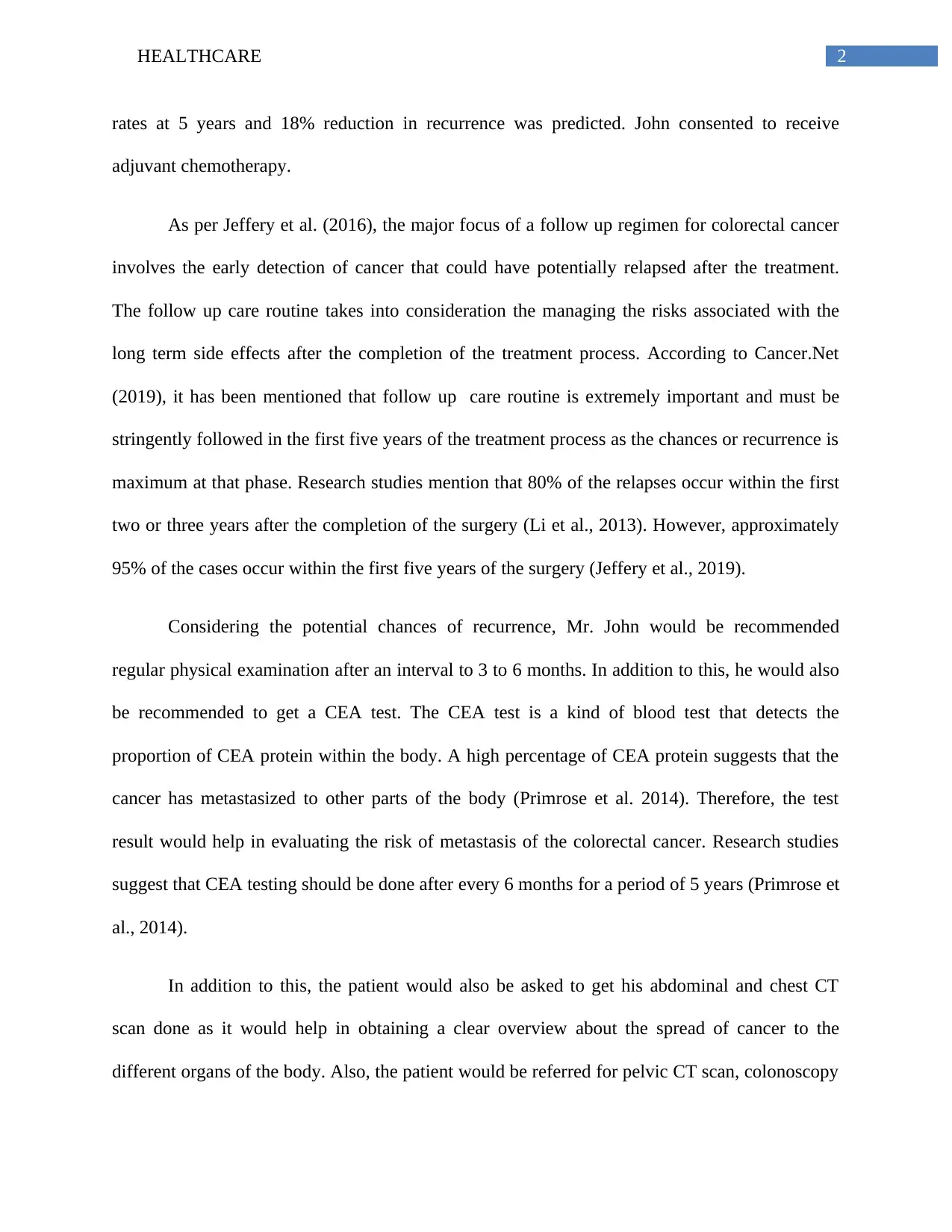
2HEALTHCARE
rates at 5 years and 18% reduction in recurrence was predicted. John consented to receive
adjuvant chemotherapy.
As per Jeffery et al. (2016), the major focus of a follow up regimen for colorectal cancer
involves the early detection of cancer that could have potentially relapsed after the treatment.
The follow up care routine takes into consideration the managing the risks associated with the
long term side effects after the completion of the treatment process. According to Cancer.Net
(2019), it has been mentioned that follow up care routine is extremely important and must be
stringently followed in the first five years of the treatment process as the chances or recurrence is
maximum at that phase. Research studies mention that 80% of the relapses occur within the first
two or three years after the completion of the surgery (Li et al., 2013). However, approximately
95% of the cases occur within the first five years of the surgery (Jeffery et al., 2019).
Considering the potential chances of recurrence, Mr. John would be recommended
regular physical examination after an interval to 3 to 6 months. In addition to this, he would also
be recommended to get a CEA test. The CEA test is a kind of blood test that detects the
proportion of CEA protein within the body. A high percentage of CEA protein suggests that the
cancer has metastasized to other parts of the body (Primrose et al. 2014). Therefore, the test
result would help in evaluating the risk of metastasis of the colorectal cancer. Research studies
suggest that CEA testing should be done after every 6 months for a period of 5 years (Primrose et
al., 2014).
In addition to this, the patient would also be asked to get his abdominal and chest CT
scan done as it would help in obtaining a clear overview about the spread of cancer to the
different organs of the body. Also, the patient would be referred for pelvic CT scan, colonoscopy
rates at 5 years and 18% reduction in recurrence was predicted. John consented to receive
adjuvant chemotherapy.
As per Jeffery et al. (2016), the major focus of a follow up regimen for colorectal cancer
involves the early detection of cancer that could have potentially relapsed after the treatment.
The follow up care routine takes into consideration the managing the risks associated with the
long term side effects after the completion of the treatment process. According to Cancer.Net
(2019), it has been mentioned that follow up care routine is extremely important and must be
stringently followed in the first five years of the treatment process as the chances or recurrence is
maximum at that phase. Research studies mention that 80% of the relapses occur within the first
two or three years after the completion of the surgery (Li et al., 2013). However, approximately
95% of the cases occur within the first five years of the surgery (Jeffery et al., 2019).
Considering the potential chances of recurrence, Mr. John would be recommended
regular physical examination after an interval to 3 to 6 months. In addition to this, he would also
be recommended to get a CEA test. The CEA test is a kind of blood test that detects the
proportion of CEA protein within the body. A high percentage of CEA protein suggests that the
cancer has metastasized to other parts of the body (Primrose et al. 2014). Therefore, the test
result would help in evaluating the risk of metastasis of the colorectal cancer. Research studies
suggest that CEA testing should be done after every 6 months for a period of 5 years (Primrose et
al., 2014).
In addition to this, the patient would also be asked to get his abdominal and chest CT
scan done as it would help in obtaining a clear overview about the spread of cancer to the
different organs of the body. Also, the patient would be referred for pelvic CT scan, colonoscopy
⊘ This is a preview!⊘
Do you want full access?
Subscribe today to unlock all pages.

Trusted by 1+ million students worldwide
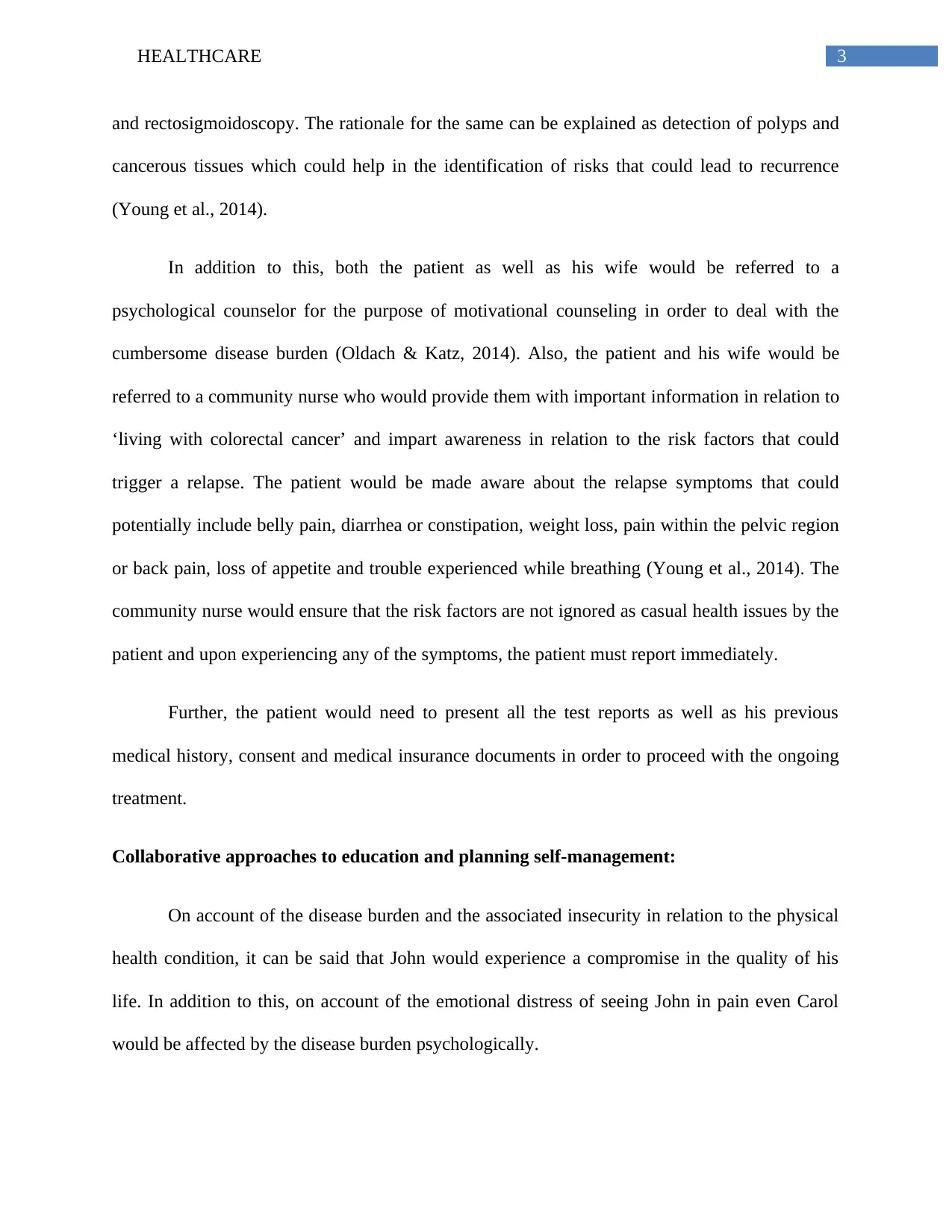
3HEALTHCARE
and rectosigmoidoscopy. The rationale for the same can be explained as detection of polyps and
cancerous tissues which could help in the identification of risks that could lead to recurrence
(Young et al., 2014).
In addition to this, both the patient as well as his wife would be referred to a
psychological counselor for the purpose of motivational counseling in order to deal with the
cumbersome disease burden (Oldach & Katz, 2014). Also, the patient and his wife would be
referred to a community nurse who would provide them with important information in relation to
‘living with colorectal cancer’ and impart awareness in relation to the risk factors that could
trigger a relapse. The patient would be made aware about the relapse symptoms that could
potentially include belly pain, diarrhea or constipation, weight loss, pain within the pelvic region
or back pain, loss of appetite and trouble experienced while breathing (Young et al., 2014). The
community nurse would ensure that the risk factors are not ignored as casual health issues by the
patient and upon experiencing any of the symptoms, the patient must report immediately.
Further, the patient would need to present all the test reports as well as his previous
medical history, consent and medical insurance documents in order to proceed with the ongoing
treatment.
Collaborative approaches to education and planning self-management:
On account of the disease burden and the associated insecurity in relation to the physical
health condition, it can be said that John would experience a compromise in the quality of his
life. In addition to this, on account of the emotional distress of seeing John in pain even Carol
would be affected by the disease burden psychologically.
and rectosigmoidoscopy. The rationale for the same can be explained as detection of polyps and
cancerous tissues which could help in the identification of risks that could lead to recurrence
(Young et al., 2014).
In addition to this, both the patient as well as his wife would be referred to a
psychological counselor for the purpose of motivational counseling in order to deal with the
cumbersome disease burden (Oldach & Katz, 2014). Also, the patient and his wife would be
referred to a community nurse who would provide them with important information in relation to
‘living with colorectal cancer’ and impart awareness in relation to the risk factors that could
trigger a relapse. The patient would be made aware about the relapse symptoms that could
potentially include belly pain, diarrhea or constipation, weight loss, pain within the pelvic region
or back pain, loss of appetite and trouble experienced while breathing (Young et al., 2014). The
community nurse would ensure that the risk factors are not ignored as casual health issues by the
patient and upon experiencing any of the symptoms, the patient must report immediately.
Further, the patient would need to present all the test reports as well as his previous
medical history, consent and medical insurance documents in order to proceed with the ongoing
treatment.
Collaborative approaches to education and planning self-management:
On account of the disease burden and the associated insecurity in relation to the physical
health condition, it can be said that John would experience a compromise in the quality of his
life. In addition to this, on account of the emotional distress of seeing John in pain even Carol
would be affected by the disease burden psychologically.
Paraphrase This Document
Need a fresh take? Get an instant paraphrase of this document with our AI Paraphraser
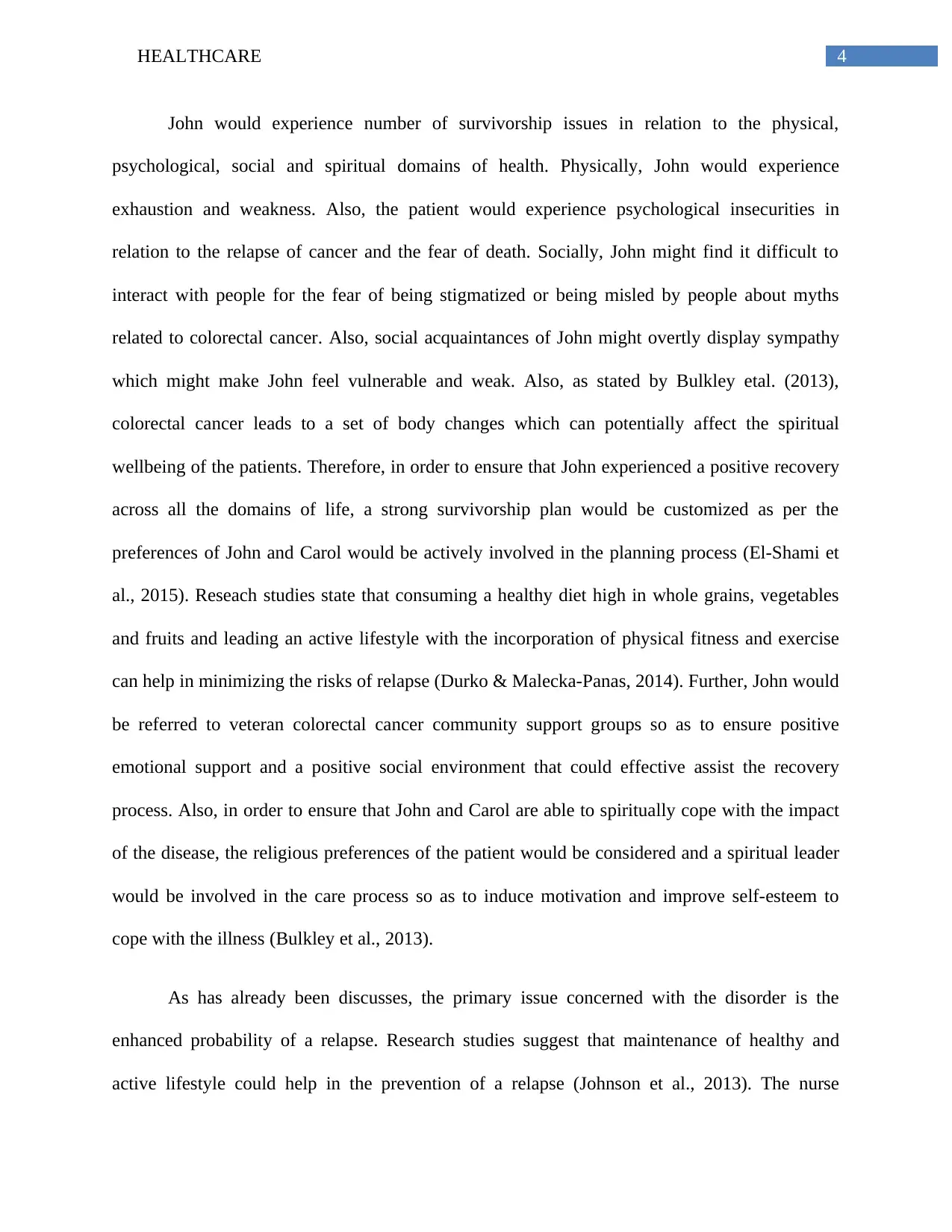
4HEALTHCARE
John would experience number of survivorship issues in relation to the physical,
psychological, social and spiritual domains of health. Physically, John would experience
exhaustion and weakness. Also, the patient would experience psychological insecurities in
relation to the relapse of cancer and the fear of death. Socially, John might find it difficult to
interact with people for the fear of being stigmatized or being misled by people about myths
related to colorectal cancer. Also, social acquaintances of John might overtly display sympathy
which might make John feel vulnerable and weak. Also, as stated by Bulkley etal. (2013),
colorectal cancer leads to a set of body changes which can potentially affect the spiritual
wellbeing of the patients. Therefore, in order to ensure that John experienced a positive recovery
across all the domains of life, a strong survivorship plan would be customized as per the
preferences of John and Carol would be actively involved in the planning process (El-Shami et
al., 2015). Reseach studies state that consuming a healthy diet high in whole grains, vegetables
and fruits and leading an active lifestyle with the incorporation of physical fitness and exercise
can help in minimizing the risks of relapse (Durko & Malecka-Panas, 2014). Further, John would
be referred to veteran colorectal cancer community support groups so as to ensure positive
emotional support and a positive social environment that could effective assist the recovery
process. Also, in order to ensure that John and Carol are able to spiritually cope with the impact
of the disease, the religious preferences of the patient would be considered and a spiritual leader
would be involved in the care process so as to induce motivation and improve self-esteem to
cope with the illness (Bulkley et al., 2013).
As has already been discusses, the primary issue concerned with the disorder is the
enhanced probability of a relapse. Research studies suggest that maintenance of healthy and
active lifestyle could help in the prevention of a relapse (Johnson et al., 2013). The nurse
John would experience number of survivorship issues in relation to the physical,
psychological, social and spiritual domains of health. Physically, John would experience
exhaustion and weakness. Also, the patient would experience psychological insecurities in
relation to the relapse of cancer and the fear of death. Socially, John might find it difficult to
interact with people for the fear of being stigmatized or being misled by people about myths
related to colorectal cancer. Also, social acquaintances of John might overtly display sympathy
which might make John feel vulnerable and weak. Also, as stated by Bulkley etal. (2013),
colorectal cancer leads to a set of body changes which can potentially affect the spiritual
wellbeing of the patients. Therefore, in order to ensure that John experienced a positive recovery
across all the domains of life, a strong survivorship plan would be customized as per the
preferences of John and Carol would be actively involved in the planning process (El-Shami et
al., 2015). Reseach studies state that consuming a healthy diet high in whole grains, vegetables
and fruits and leading an active lifestyle with the incorporation of physical fitness and exercise
can help in minimizing the risks of relapse (Durko & Malecka-Panas, 2014). Further, John would
be referred to veteran colorectal cancer community support groups so as to ensure positive
emotional support and a positive social environment that could effective assist the recovery
process. Also, in order to ensure that John and Carol are able to spiritually cope with the impact
of the disease, the religious preferences of the patient would be considered and a spiritual leader
would be involved in the care process so as to induce motivation and improve self-esteem to
cope with the illness (Bulkley et al., 2013).
As has already been discusses, the primary issue concerned with the disorder is the
enhanced probability of a relapse. Research studies suggest that maintenance of healthy and
active lifestyle could help in the prevention of a relapse (Johnson et al., 2013). The nurse
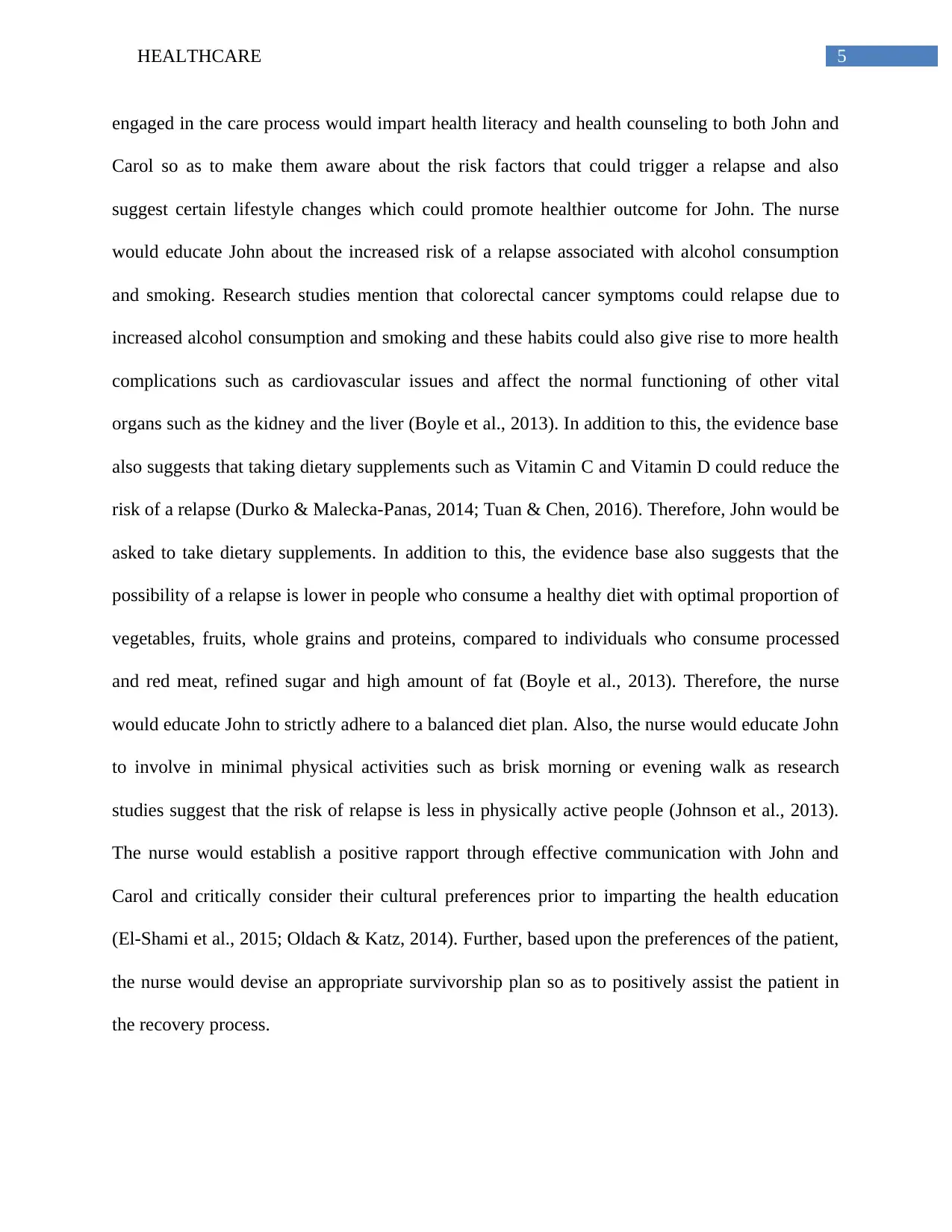
5HEALTHCARE
engaged in the care process would impart health literacy and health counseling to both John and
Carol so as to make them aware about the risk factors that could trigger a relapse and also
suggest certain lifestyle changes which could promote healthier outcome for John. The nurse
would educate John about the increased risk of a relapse associated with alcohol consumption
and smoking. Research studies mention that colorectal cancer symptoms could relapse due to
increased alcohol consumption and smoking and these habits could also give rise to more health
complications such as cardiovascular issues and affect the normal functioning of other vital
organs such as the kidney and the liver (Boyle et al., 2013). In addition to this, the evidence base
also suggests that taking dietary supplements such as Vitamin C and Vitamin D could reduce the
risk of a relapse (Durko & Malecka-Panas, 2014; Tuan & Chen, 2016). Therefore, John would be
asked to take dietary supplements. In addition to this, the evidence base also suggests that the
possibility of a relapse is lower in people who consume a healthy diet with optimal proportion of
vegetables, fruits, whole grains and proteins, compared to individuals who consume processed
and red meat, refined sugar and high amount of fat (Boyle et al., 2013). Therefore, the nurse
would educate John to strictly adhere to a balanced diet plan. Also, the nurse would educate John
to involve in minimal physical activities such as brisk morning or evening walk as research
studies suggest that the risk of relapse is less in physically active people (Johnson et al., 2013).
The nurse would establish a positive rapport through effective communication with John and
Carol and critically consider their cultural preferences prior to imparting the health education
(El-Shami et al., 2015; Oldach & Katz, 2014). Further, based upon the preferences of the patient,
the nurse would devise an appropriate survivorship plan so as to positively assist the patient in
the recovery process.
engaged in the care process would impart health literacy and health counseling to both John and
Carol so as to make them aware about the risk factors that could trigger a relapse and also
suggest certain lifestyle changes which could promote healthier outcome for John. The nurse
would educate John about the increased risk of a relapse associated with alcohol consumption
and smoking. Research studies mention that colorectal cancer symptoms could relapse due to
increased alcohol consumption and smoking and these habits could also give rise to more health
complications such as cardiovascular issues and affect the normal functioning of other vital
organs such as the kidney and the liver (Boyle et al., 2013). In addition to this, the evidence base
also suggests that taking dietary supplements such as Vitamin C and Vitamin D could reduce the
risk of a relapse (Durko & Malecka-Panas, 2014; Tuan & Chen, 2016). Therefore, John would be
asked to take dietary supplements. In addition to this, the evidence base also suggests that the
possibility of a relapse is lower in people who consume a healthy diet with optimal proportion of
vegetables, fruits, whole grains and proteins, compared to individuals who consume processed
and red meat, refined sugar and high amount of fat (Boyle et al., 2013). Therefore, the nurse
would educate John to strictly adhere to a balanced diet plan. Also, the nurse would educate John
to involve in minimal physical activities such as brisk morning or evening walk as research
studies suggest that the risk of relapse is less in physically active people (Johnson et al., 2013).
The nurse would establish a positive rapport through effective communication with John and
Carol and critically consider their cultural preferences prior to imparting the health education
(El-Shami et al., 2015; Oldach & Katz, 2014). Further, based upon the preferences of the patient,
the nurse would devise an appropriate survivorship plan so as to positively assist the patient in
the recovery process.
⊘ This is a preview!⊘
Do you want full access?
Subscribe today to unlock all pages.

Trusted by 1+ million students worldwide
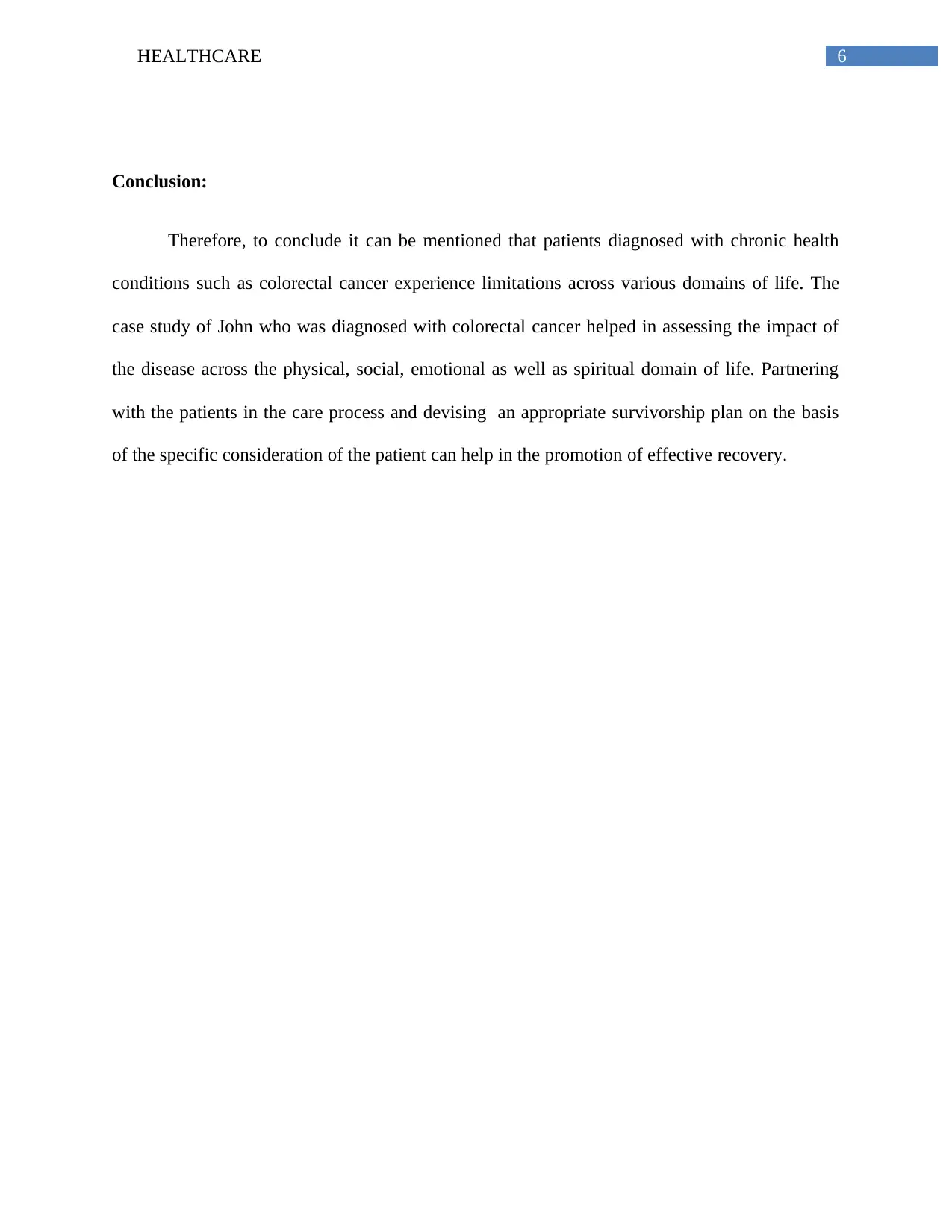
6HEALTHCARE
Conclusion:
Therefore, to conclude it can be mentioned that patients diagnosed with chronic health
conditions such as colorectal cancer experience limitations across various domains of life. The
case study of John who was diagnosed with colorectal cancer helped in assessing the impact of
the disease across the physical, social, emotional as well as spiritual domain of life. Partnering
with the patients in the care process and devising an appropriate survivorship plan on the basis
of the specific consideration of the patient can help in the promotion of effective recovery.
Conclusion:
Therefore, to conclude it can be mentioned that patients diagnosed with chronic health
conditions such as colorectal cancer experience limitations across various domains of life. The
case study of John who was diagnosed with colorectal cancer helped in assessing the impact of
the disease across the physical, social, emotional as well as spiritual domain of life. Partnering
with the patients in the care process and devising an appropriate survivorship plan on the basis
of the specific consideration of the patient can help in the promotion of effective recovery.
Paraphrase This Document
Need a fresh take? Get an instant paraphrase of this document with our AI Paraphraser
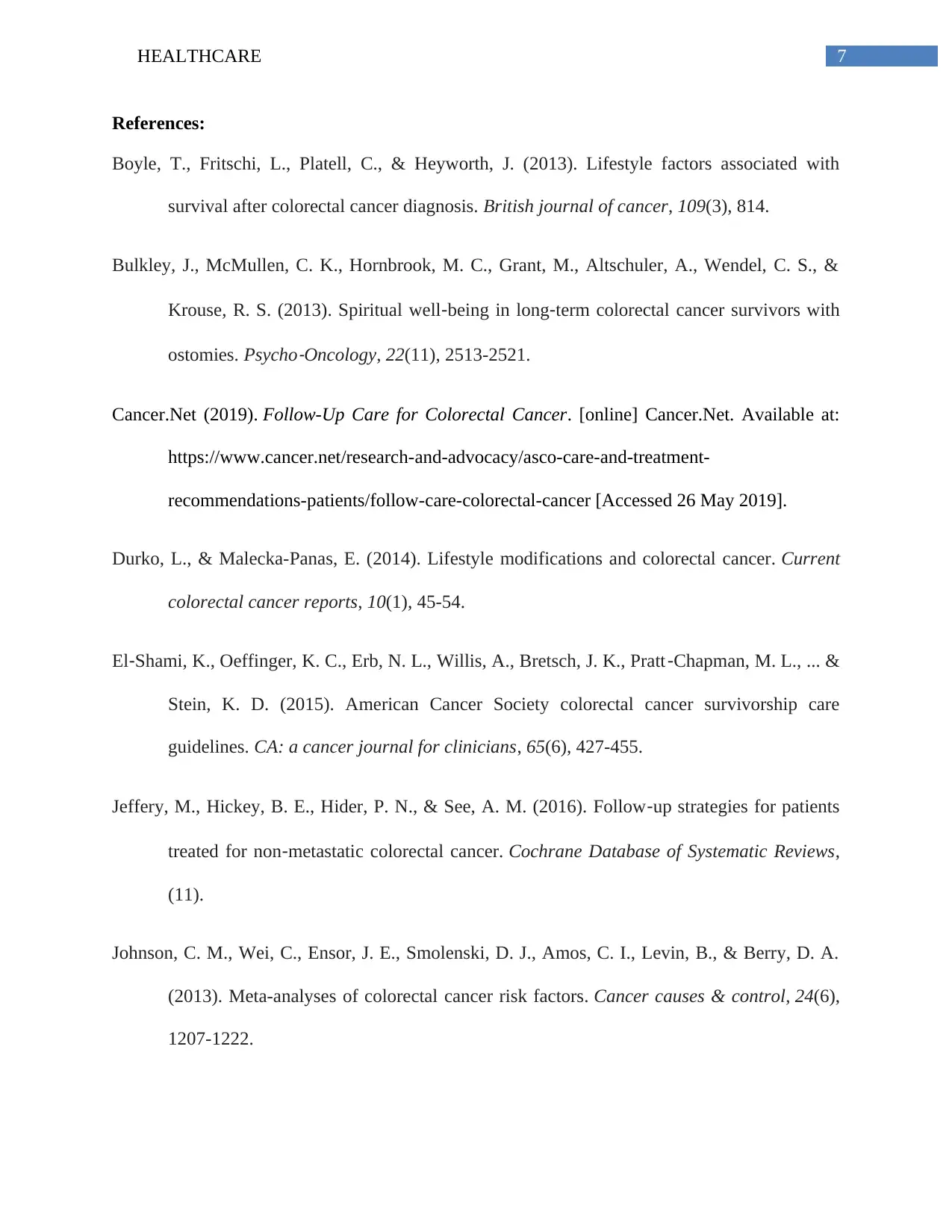
7HEALTHCARE
References:
Boyle, T., Fritschi, L., Platell, C., & Heyworth, J. (2013). Lifestyle factors associated with
survival after colorectal cancer diagnosis. British journal of cancer, 109(3), 814.
Bulkley, J., McMullen, C. K., Hornbrook, M. C., Grant, M., Altschuler, A., Wendel, C. S., &
Krouse, R. S. (2013). Spiritual well‐being in long‐term colorectal cancer survivors with
ostomies. Psycho
‐Oncology, 22(11), 2513-2521.
Cancer.Net (2019). Follow-Up Care for Colorectal Cancer. [online] Cancer.Net. Available at:
https://www.cancer.net/research-and-advocacy/asco-care-and-treatment-
recommendations-patients/follow-care-colorectal-cancer [Accessed 26 May 2019].
Durko, L., & Malecka-Panas, E. (2014). Lifestyle modifications and colorectal cancer. Current
colorectal cancer reports, 10(1), 45-54.
El‐Shami, K., Oeffinger, K. C., Erb, N. L., Willis, A., Bretsch, J. K., Pratt‐Chapman, M. L., ... &
Stein, K. D. (2015). American Cancer Society colorectal cancer survivorship care
guidelines. CA: a cancer journal for clinicians, 65(6), 427-455.
Jeffery, M., Hickey, B. E., Hider, P. N., & See, A. M. (2016). Follow‐up strategies for patients
treated for non‐metastatic colorectal cancer. Cochrane Database of Systematic Reviews,
(11).
Johnson, C. M., Wei, C., Ensor, J. E., Smolenski, D. J., Amos, C. I., Levin, B., & Berry, D. A.
(2013). Meta-analyses of colorectal cancer risk factors. Cancer causes & control, 24(6),
1207-1222.
References:
Boyle, T., Fritschi, L., Platell, C., & Heyworth, J. (2013). Lifestyle factors associated with
survival after colorectal cancer diagnosis. British journal of cancer, 109(3), 814.
Bulkley, J., McMullen, C. K., Hornbrook, M. C., Grant, M., Altschuler, A., Wendel, C. S., &
Krouse, R. S. (2013). Spiritual well‐being in long‐term colorectal cancer survivors with
ostomies. Psycho
‐Oncology, 22(11), 2513-2521.
Cancer.Net (2019). Follow-Up Care for Colorectal Cancer. [online] Cancer.Net. Available at:
https://www.cancer.net/research-and-advocacy/asco-care-and-treatment-
recommendations-patients/follow-care-colorectal-cancer [Accessed 26 May 2019].
Durko, L., & Malecka-Panas, E. (2014). Lifestyle modifications and colorectal cancer. Current
colorectal cancer reports, 10(1), 45-54.
El‐Shami, K., Oeffinger, K. C., Erb, N. L., Willis, A., Bretsch, J. K., Pratt‐Chapman, M. L., ... &
Stein, K. D. (2015). American Cancer Society colorectal cancer survivorship care
guidelines. CA: a cancer journal for clinicians, 65(6), 427-455.
Jeffery, M., Hickey, B. E., Hider, P. N., & See, A. M. (2016). Follow‐up strategies for patients
treated for non‐metastatic colorectal cancer. Cochrane Database of Systematic Reviews,
(11).
Johnson, C. M., Wei, C., Ensor, J. E., Smolenski, D. J., Amos, C. I., Levin, B., & Berry, D. A.
(2013). Meta-analyses of colorectal cancer risk factors. Cancer causes & control, 24(6),
1207-1222.
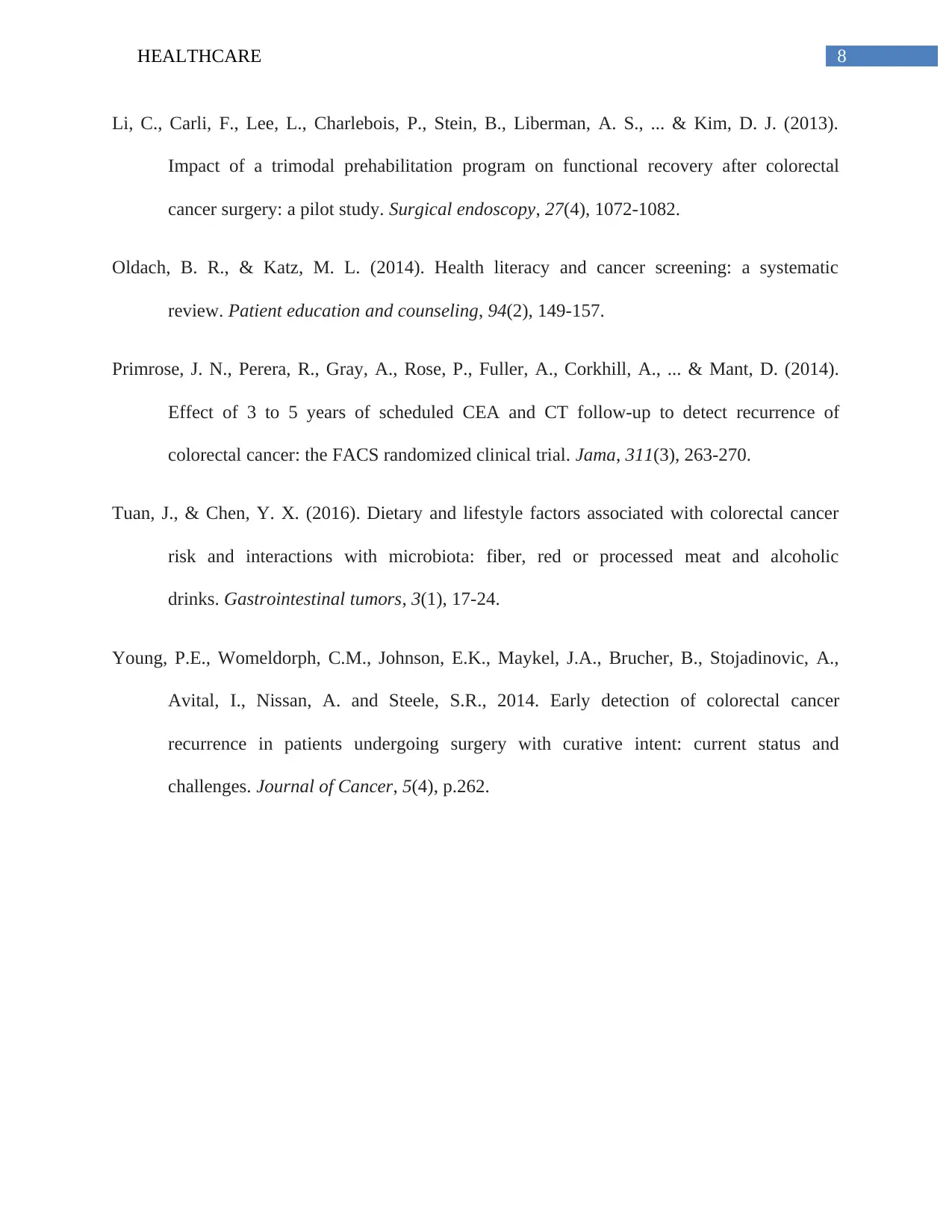
8HEALTHCARE
Li, C., Carli, F., Lee, L., Charlebois, P., Stein, B., Liberman, A. S., ... & Kim, D. J. (2013).
Impact of a trimodal prehabilitation program on functional recovery after colorectal
cancer surgery: a pilot study. Surgical endoscopy, 27(4), 1072-1082.
Oldach, B. R., & Katz, M. L. (2014). Health literacy and cancer screening: a systematic
review. Patient education and counseling, 94(2), 149-157.
Primrose, J. N., Perera, R., Gray, A., Rose, P., Fuller, A., Corkhill, A., ... & Mant, D. (2014).
Effect of 3 to 5 years of scheduled CEA and CT follow-up to detect recurrence of
colorectal cancer: the FACS randomized clinical trial. Jama, 311(3), 263-270.
Tuan, J., & Chen, Y. X. (2016). Dietary and lifestyle factors associated with colorectal cancer
risk and interactions with microbiota: fiber, red or processed meat and alcoholic
drinks. Gastrointestinal tumors, 3(1), 17-24.
Young, P.E., Womeldorph, C.M., Johnson, E.K., Maykel, J.A., Brucher, B., Stojadinovic, A.,
Avital, I., Nissan, A. and Steele, S.R., 2014. Early detection of colorectal cancer
recurrence in patients undergoing surgery with curative intent: current status and
challenges. Journal of Cancer, 5(4), p.262.
Li, C., Carli, F., Lee, L., Charlebois, P., Stein, B., Liberman, A. S., ... & Kim, D. J. (2013).
Impact of a trimodal prehabilitation program on functional recovery after colorectal
cancer surgery: a pilot study. Surgical endoscopy, 27(4), 1072-1082.
Oldach, B. R., & Katz, M. L. (2014). Health literacy and cancer screening: a systematic
review. Patient education and counseling, 94(2), 149-157.
Primrose, J. N., Perera, R., Gray, A., Rose, P., Fuller, A., Corkhill, A., ... & Mant, D. (2014).
Effect of 3 to 5 years of scheduled CEA and CT follow-up to detect recurrence of
colorectal cancer: the FACS randomized clinical trial. Jama, 311(3), 263-270.
Tuan, J., & Chen, Y. X. (2016). Dietary and lifestyle factors associated with colorectal cancer
risk and interactions with microbiota: fiber, red or processed meat and alcoholic
drinks. Gastrointestinal tumors, 3(1), 17-24.
Young, P.E., Womeldorph, C.M., Johnson, E.K., Maykel, J.A., Brucher, B., Stojadinovic, A.,
Avital, I., Nissan, A. and Steele, S.R., 2014. Early detection of colorectal cancer
recurrence in patients undergoing surgery with curative intent: current status and
challenges. Journal of Cancer, 5(4), p.262.
⊘ This is a preview!⊘
Do you want full access?
Subscribe today to unlock all pages.

Trusted by 1+ million students worldwide
1 out of 9
Related Documents
Your All-in-One AI-Powered Toolkit for Academic Success.
+13062052269
info@desklib.com
Available 24*7 on WhatsApp / Email
![[object Object]](/_next/static/media/star-bottom.7253800d.svg)
Unlock your academic potential
Copyright © 2020–2026 A2Z Services. All Rights Reserved. Developed and managed by ZUCOL.





